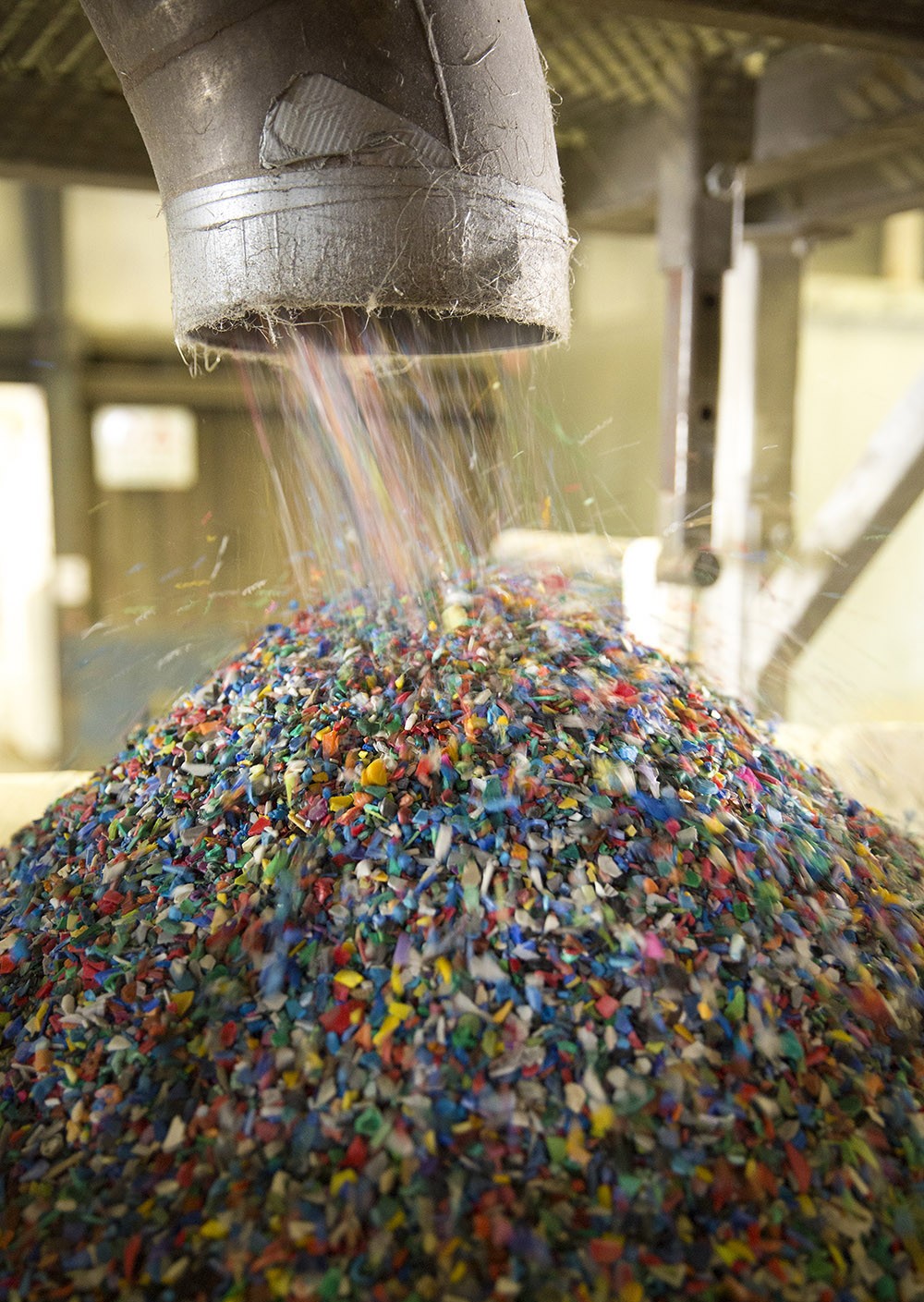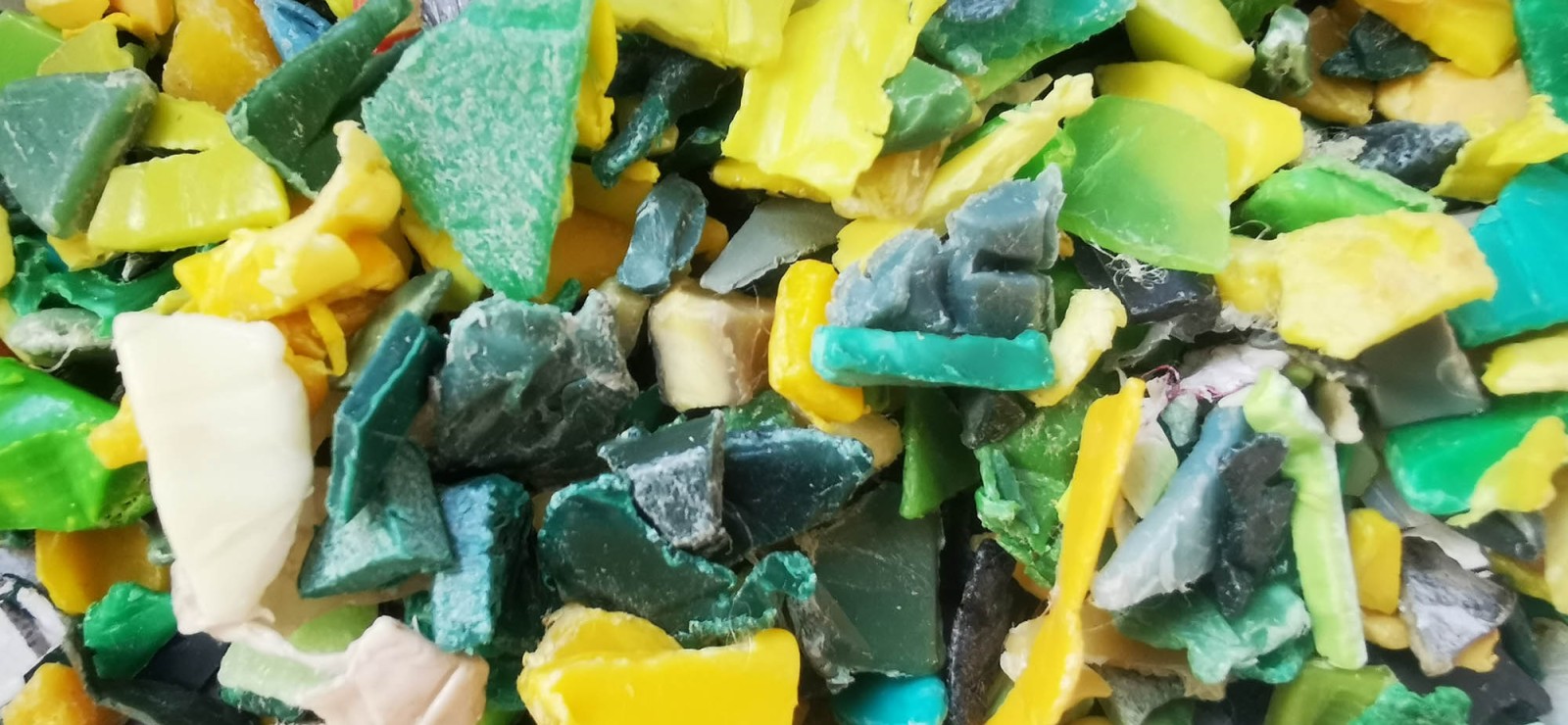Urban companies are struggling to deal with their plastic waste. The PlastiCity project, which spans four countries, is looking for practical solutions to send their recycling percentage sky high. Ghent University engineer Gianni Vyncke is involved. “The aim is to recycle plastic into sustainable products for the city.”
For engineer Gianni Vyncke, from the department of Green Chemistry and Technology, plastic packaging is much more than just waste. “There is so much plastic lurking in our environment”, he admits. “It is a serious problem, even though plastic is also fantastic. After all, the applications of synthetic materials such as plastic have really enhanced progress in our society. Plastic weighs almost nothing and is very strong. We use it to pack our food, which helps to combat food waste. We use it for insulating our homes, and synthetic materials make our cars lights, which means we consume less fuel.”
Grave pollution, such as the plastic soup, are down to consumers treating the product inappropriately, in his opinion. “Many people view single-use plastic as worthless, which is a shame. After all, plastics are actually highly valuable materials. That’s why we must treat them with care and re-use them as much as possible.”
As part of the international project PlastiCity, Gianni Vyncke is now helping to research the recycling of plastic waste from urban businesses. “With PlastiCity we are testing how we can boost the collection and recycling of commercial and industrial plastic waste in Ghent, Den Haag in the Netherlands, Southend-on-Sea in Great Britain and Douai in France. That is far more complicated than it may appear. Meanwhile, the collection and re-use of PMD (plastic, metals & drink cartons) waste from families is well organised. Also, many large companies in and around cities have their waste flows well under control. However, a whole range of smaller businesses, such as bakers, pizzerias or clothes stores do not realise the value of their plastic waste.”
Do they actually produce such a large amount of waste?
“Clothes stores receive every garment wrapped in transparent film. Clothes hangers are made of plastic too. Meanwhile, bakers, pitta vendors and chip shops gather an enormous supply of large buckets, originally containers for food, ingredients or sauces. Before the launch of PlastiCity this wide range of plastics was hardly recycled. They very often ended up being discarded together with the non-recyclable waste and therefore burned in the incinerator. Using the knowledge that is being gathered by PlastiCity, we aim to drastically increase the rate of recycling among these small enterprises. It currently fluctuates between 20 and 30 per cent.”
Is that so low?
“In the context of the global plastics recycling industry, that is actually not so bad. However, there is a really significant margin for improvement. Our ambition is to re-use at least 50 to 60 per cent of the plastic mountain from smaller urban companies. Even so, we do not control the entire chain and are therefore dependent on others, for example, the recycling companies.”
Why is PlastiCity a pilot project?
“There are quite a number of private waste collectors collecting plastic from small urban enterprises, however, there is no common strategy. We are now assessing the best way to manage the collection and recycling. City councils, waste collectors and processing companies are watching our research like a hawk. After all, once a sustainable business model can be refined and is also profitable, they will certainly join in. That’s fine for us, because that means our mission has been successful.
In the cities where PlastiCity is being tested, we invite shops and companies to spend a while working with us. In Ghent we are focussing on the collection and processing of flexible film and rigid plastic packaging.”

So not all plastics are the same?
“There are an incredible number of plastics, and each must be recycled in a different way. Anyway, by choosing rigids and flexibles we are taking charge of two large streams of plastic waste. Buckets and clothes hangers are classified as rigids; plastic clothes wrappings as flexibles. Recycling companies are specialised in either one or the other. A mix of these two streams creates problems when recycling. That is why we ask participating companies to gather their flexible and rigid plastic waste in separate bags.
In our four participating cities we have specifically chosen different methods of collection. For example, in Ghent we collect the waste on a weekly basis using an electric van; in Den Haag we are using electric cargo bikes. In doing so, we are testing the best and most sustainable solution for each urban environment.”
Cities are not the same?
“The differences can be quite large. Take Ghent, for example: our city has international acclaim due to its traffic plan that keeps through traffic away from the city centre. However, that makes the collection of plastic waste for recycling a logistical nightmare, even when this is done with an electric van.
The domestic PMD waste is collected every fortnight. We can now see that this period is much too long for a city store, which has little space for a waste container. In order to be rid of their piles of plastic, some still end up dumping it with their non-recyclable waste. We are therefore learning that it is better to add a few extra rounds.
Den Haag has many narrow streets making it tricky for cars to manoeuvre, which is why we chose the cargo bike. In Ghent, we are gathering the plastic waste in a central hub at the port, with separate containers for rigids and flexibles. From there the containers are dispatched to our recycling partners.”
You also organise regular design workshops?
“We are keen to make people aware of how sophisticated the process of plastic recycling really is. It seems simple, but in fact it is very complex. In our design workshops we are working with designers and companies to search for opportunities to re-use the collected plastic materials. We are also investigating what happens to the quality of the plastics. Indeed, the intention is to recycle as much plastic as possible and turn it into sustainable products for the city.
Together with designers we are concentrating on making products with high-quality plastic. We are therefore considering new recycled plant holders or outer-wall installations for use in e.g. urban farming. Recycled plastics can also contribute to better mobility. In Ghent, the many tram lines cause regular and serious cycling accidents. Recycled plastic can potentially help to make the tracks safer.”
Gianni Vyncke is an engineer in the department of Green Chemistry and Technology. As part of the international project PlastiCity. Gianni Vyncke is helping to research the recycling of plastic waste from urban businesses.
Read also
Purifying water helps both companies and the planet move forward
Companies, farmers, nature and consumers alike depend on water. Yet despite the fact that 70% of the Earth’s surface is covered with water, only 1% of it is drinkable. And as climate change progresses, ensuring sufficient water for everyone is becoming increasingly challenging. Advancing water purification technologies is therefore more essential than ever.
Three new Stolpersteine in Ghent: the tragic story of Rifca, Valère and Falks
Around thirty Stolpersteine can be found in the sidewalks across Ghent. On November 5th, three more were added for Ghent University victims Valère, Falks, and Rifca.
Elisa demonstrates how fish waste can become a resource (and wins an award in the process)
In her master’s dissertation, bioengineer Elisa Kooy demonstrated how fish waste could find alternative uses, among others in future generations of rechargeable batteries. Her dissertation landed her the NBN Sustainability Award, which is part of the Flemish Dissertation Award. “The prize is wonderful but the process was even more valuable.”
Judith or not? In search of the first Countess of Flanders
TV show Het verhaal van Vlaanderen was certain: the box just unearthed from the City of Ghent's heritage depot contained the remains of the one and only Judith, the progenitor of the Counts of Flanders. But was that really true?




